- Regulatory Status
- RUO
- Other Names
- TNF-related apoptosis-inducing ligand (TRAIL) , APO2 Ligand (APO2L), CD253, TL2
- Ave. Rating
- Submit a Review
- Product Citations
- publications
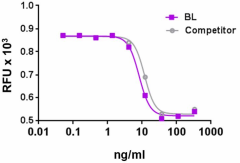
-

Recombinant human TRAIL (TNFSF10) induces cytotoxicity in mouse L929 cell line in a dose dependent manner. BioLegend’s protein was compared side-by-side to the leading competitor’s equivalent product.
Human TNF-related apoptosis-inducing ligand (TRAIL) is a type II membrane protein that consists of 281 amino acids and shares 65% identity with the mouse protein (291 amino acids) at the amino acid level. The TRAIL extracellular domain can be cleaved to form a biologically active soluble form. TRAIL binds to two apoptosis-inducing receptors, TRAIL-R1 (DR4) and TRAIL-R2 (DR5), and two decoy receptors, TRAIL-R3 (LIT, DcR1) and TRAIL-R4 (TRUNDD, DcR2). In addition, TRAIL binds to osteoprotegerin (OPG), which is a soluble receptor. Once TRAIL binds to the R1 or R2, the apoptosis process begins with the receptor trimerization and formation of the death-inducing signaling complex (DISC). Subsequently, the Fas-associated death domain (FADD) translocates to the DISC, interacts with the death domain (DD) of the receptors, and recruits procaspases 8 and 10. TRAIL plays a key role in natural killer (NK) cell-mediated and IFNγ-dependent suppression of tumor cell growth. Also, TRAIL and CD95L participate in the regulation of T helper 1 (Th1) and T helper 2 (Th2) responses. There is a reciprocal expression of TRAIL and CD95L in Th1 and Th2 cells. In vitro-differentiated Th1 cells up-regulate CD95L, whereas Th2 cells express TRAIL. Th1 cells are more sensitive than Th2 cells to TRAIL-induced apoptosis, and c-FLIP, an anti-apoptotic regulator, seems to participate in this process. TRAIL targets cancer cells and is an attractive chemotherapeutic agent. Thus, recombinant human TRAIL variants, agonistic DR4, and DR5-specific antibodies are in preclinical development.
Product DetailsProduct Details
- Source
- Human TRAIL, amino acids (Thr95 - Gly281) (Accession# NM_003810), was expressed in CHO cells with ASM-6His tag at the NH2-terminal.
- Molecular Mass
- The 196 amino acid recombinant protein has a predicted molecular mass of approximately 22.7 kD. The protein migrates at approximately 23 kD in DTT-reducing conditions and at approximately 50 kD in non-reducing conditions by SDS-PAGE. The predicted N-terminal amino acid is Ala.
- Purity
- >95%, as determined by Coomassie stained SDS-PAGE.
- Formulation
- 0.22 µm filtered protein solution is in 20mM NaH2PO4, 0.3M NaCl, 2mM CHAPS, pH 7.4.
- Endotoxin Level
- Less than 0.1 ng per µg cytokine as determined by the LAL method.
- Concentration
- 10 and 25 µg sizes are bottled at 200 µg/mL. 100 µg size and larger sizes are lot-specific and bottled at the concentration indicated on the vial. To obtain lot-specific concentration and expiration, please enter the lot number in our Certificate of Analysis online tool.
- Storage & Handling
- Unopened vial can be stored between 2°C and 8°C for up to 2 weeks, at -20°C for up to six months, or at -70°C or colder until the expiration date. For maximum results, quick spin vial prior to opening. The protein can be aliquoted and stored at -20°C or colder. Stock solutions can also be prepared at 50 - 100 µg/mL in appropriate sterile buffer, carrier protein such as 0.2 - 1% BSA or HSA can be added when preparing the stock solution. Aliquots can be stored between 2°C and 8°C for up to one week and stored at -20°C or colder for up to 3 months. Avoid repeated freeze/thaw cycles.
- Activity
- ED50 = 4 - 16 ng/ml, corresponding to a specific activity of 0.0625 - 0.25 x 106 units/mg, as determined by the cytotoxic effect on L929 cells.
- Application
-
Bioassay
- Application Notes
-
BioLegend carrier-free recombinant proteins provided in liquid format are shipped on blue-ice. Our comparison testing data indicates that when handled and stored as recommended, the liquid format has equal or better stability and shelf-life compared to commercially available lyophilized proteins after reconstitution. Our liquid proteins are verified in-house to maintain activity after shipping on blue ice and are backed by our 100% satisfaction guarantee. If you have any concerns, contact us at tech@biolegend.com.
- Product Citations
-
Antigen Details
- Structure
- Homotrimer.
- Distribution
-
Natural killer cells (NK), T cells, NKT cells, dendritic cells (DCs), B cells, monocytes, and macrophages. Neutrophils can release soluble TRAIL after appropriate stimulation.
- Function
- TRAIL/TRAIL receptor complex has immunosuppressive, immunoregulatory, proviral or antiviral, and tumor immunosurveillance functions. LPS and IFNβ induce TRAIL in monocytes and macrophages. IFNγ induces it on monocytes, DCs, and NK cells.
- Interaction
- Adipocytes, cancer cells, human hepatocellular carcinoma cells, and influenza-virus-infected pulmonary epithelial cells.
- Ligand/Receptor
- TNFRSF10A/TRAILR1, TNFRSF10B/TRAILR2, TNFRSF10C/TRAILR3, TNFRSF10D/TRAILR4, and TNFRSF11B/OPG (osteoprotegerin).
- Biology Area
- Immunology
- Molecular Family
- CD Molecules
- Antigen References
-
1. Wiley SR, et al. 1995. Immunity 3:673.
2. Ehrlich S, et al. 2003. Cytokine 24:244.
3. Zhang XR, et al. 2003. Cell Death Differ. 10:203.
4. Falschlehner C, et al. 2009. Immunology 127:145.
5. Walczak H, Haas TL. 2008. Methods Mol. Biol. 414:221.
6. Holoch PA, Griffith TS. 2009. Eur. J. Pharmacol. 625:63.
7. He MX, He YW. 2013. Cell Death Differentiation 20:188.
8. Trivedi R, Mishra DP. 2015. Front Oncol. 5:69. - Gene ID
- 8743 View all products for this Gene ID
- UniProt
- View information about TRAIL on UniProt.org
Related FAQs
- Why choose BioLegend recombinant proteins?
-
• Each lot of product is quality-tested for bioactivity as indicated on the data sheet.
• Greater than 95% Purity or higher, tested on every lot of product.
• 100% Satisfaction Guarantee for quality performance, stability, and consistency.
• Ready-to-use liquid format saves time and reduces challenges associated with reconstitution.
• Bulk and customization available. Contact us.
• Learn more about our Recombinant Proteins. - How does the activity of your recombinant proteins compare to competitors?
-
We quality control each and every lot of recombinant protein. Not only do we check its bioactivity, but we also compare it against other commercially available recombinant proteins. We make sure each recombinant protein’s activity is at least as good as or better than the competition’s. In order to provide you with the best possible product, we ensure that our testing process is rigorous and thorough. If you’re curious and eager to make the switch to BioLegend recombinants, contact your sales representative today!
- What is the specific activity or ED50 of my recombinant protein?
-
The specific activity range of the protein is indicated on the product datasheets. Because the exact activity values on a per unit basis can largely fluctuate depending on a number of factors, including the nature of the assay, cell density, age of cells/passage number, culture media used, and end user technique, the specific activity is best defined as a range and we guarantee the specific activity of all our lots will be within the range indicated on the datasheet. Please note this only applies to recombinants labeled for use in bioassays. ELISA standard recombinant proteins are not recommended for bioassay usage as they are not tested for these applications.
- Have your recombinants been tested for stability?
-
Our testing shows that the recombinant proteins are able to withstand room temperature for a week without losing activity. In addition the recombinant proteins were also found to withstand four cycles of freeze and thaw without losing activity.
- Does specific activity of a recombinant protein vary between lots?
-
Specific activity will vary for each lot and for the type of experiment that is done to validate it, but all passed lots will have activity within the established ED50 range for the product and we guarantee that our products will have lot-to-lot consistency. Please conduct an experiment-specific validation to find the optimal ED50 for your system.
- How do you convert activity as an ED50 in ng/ml to a specific activity in Units/mg?
-
Use formula Specific activity (Units/mg) = 10^6/ ED50 (ng/mL)





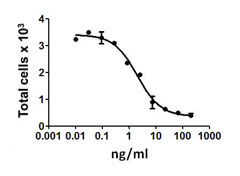
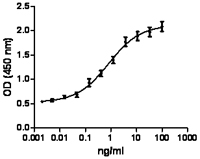
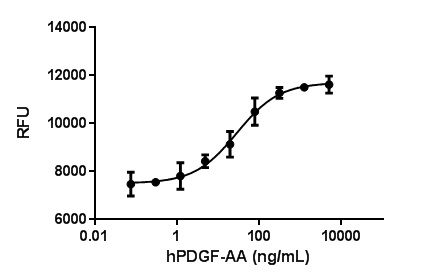
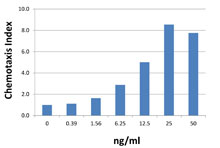



Follow Us